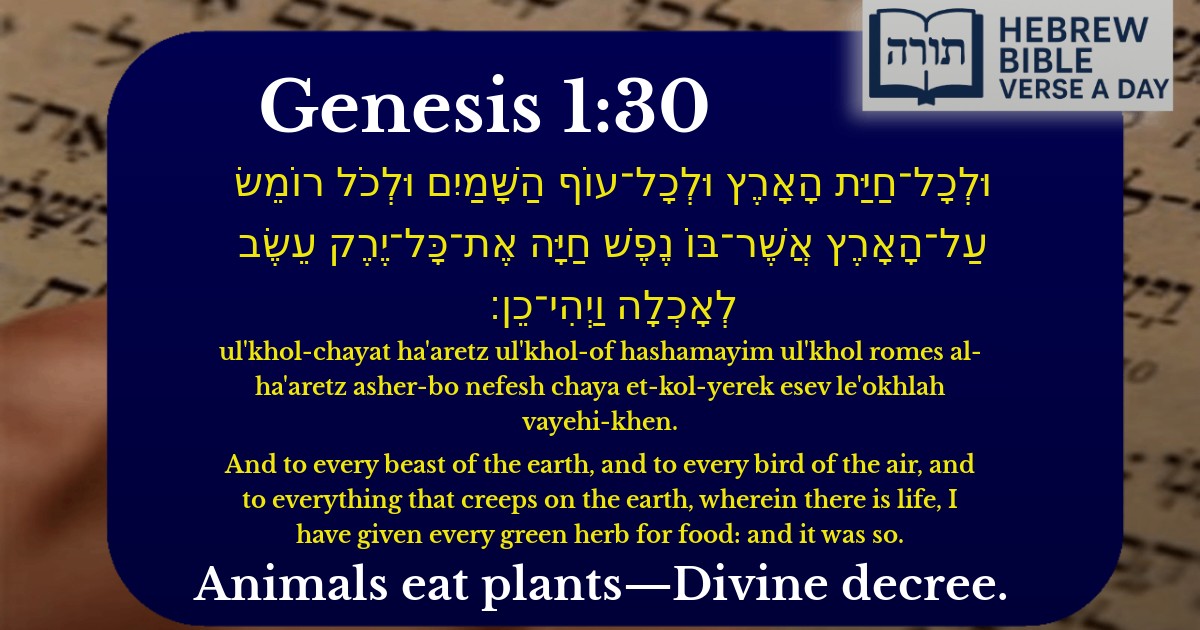Join Our Newsletter To Be Informed When New Videos Are Posted
Join the thousands of fellow Studends who rely on our videos to learn how to read the bible in Hebrew for free!
Hebrew Text
וּלְכָל־חַיַּת הָאָרֶץ וּלְכָל־עוֹף הַשָּׁמַיִם וּלְכֹל רוֹמֵשׂ עַל־הָאָרֶץ אֲשֶׁר־בּוֹ נֶפֶשׁ חַיָּה אֶת־כָּל־יֶרֶק עֵשֶׂב לְאָכְלָה וַיְהִי־כֵן׃
English Translation
And to every beast of the earth, and to every bird of the air, and to everything that creeps on the earth, wherein there is life, I have given every green herb for food: and it was so.
Transliteration
Ul'khol-chayat ha'aretz ul'khol-of hashamayim ul'khol romes al-ha'aretz asher-bo nefesh chaya et-kol-yerek esev le'okhlah vayehi-khen.
Hebrew Leining Text
וּֽלְכׇל־חַיַּ֣ת הָ֠אָ֠רֶץ וּלְכׇל־ע֨וֹף הַשָּׁמַ֜יִם וּלְכֹ֣ל <b>׀</b> רוֹמֵ֣שׂ עַל־הָאָ֗רֶץ אֲשֶׁר־בּוֹ֙ נֶ֣פֶשׁ חַיָּ֔ה אֶת־כׇּל־יֶ֥רֶק עֵ֖שֶׂב לְאׇכְלָ֑ה וַֽיְהִי־כֵֽן׃
וּֽלְכׇל־חַיַּ֣ת הָ֠אָ֠רֶץ וּלְכׇל־ע֨וֹף הַשָּׁמַ֜יִם וּלְכֹ֣ל ׀ רוֹמֵ֣שׂ עַל־הָאָ֗רֶץ אֲשֶׁר־בּוֹ֙ נֶ֣פֶשׁ חַיָּ֔ה אֶת־כׇּל־יֶ֥רֶק עֵ֖שֶׂב לְאׇכְלָ֑ה וַֽיְהִי־כֵֽן׃
🎵 Listen to leining
Parasha Commentary
📚 Talmud Citations
This verse is not quoted in the Talmud.


Context in Creation
This verse (Bereishit 1:30) concludes Hashem's provision for all living creatures during the six days of creation. Rashi explains that this demonstrates Hashem's compassion, ensuring sustenance for all creatures from the very beginning. Unlike humans, who were given permission to eat meat only after the flood (Bereishit 9:3), animals were originally designated a vegetarian diet.
The Nature of Animal Sustenance
Rambam (Moreh Nevuchim 3:48) notes that this verse reflects the divine wisdom in creation—each species receives appropriate nourishment. The phrase "every green herb for food" indicates that herbivorous animals were created to sustain themselves without predation, aligning with the original harmony of creation before human sin introduced imbalance.
Spiritual Symbolism
The Midrash (Bereishit Rabbah 20:19) connects this verse to the ideal state of the world, where all creatures lived peacefully. The Talmud (Sanhedrin 59b) further teaches that Adam and Chava were initially permitted only plants, emphasizing that violence—even among animals—was not part of Hashem's original plan.
Halachic Implications
Ethical Lessons
The Netziv (Ha'amek Davar) observes that the phrase "and it was so" confirms the permanence of Hashem's decree. This implies that humanity, as stewards of creation, must ensure animals' access to food—a foundation for the mitzvah of tza'ar ba'alei chayim (preventing animal suffering).